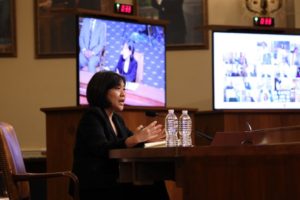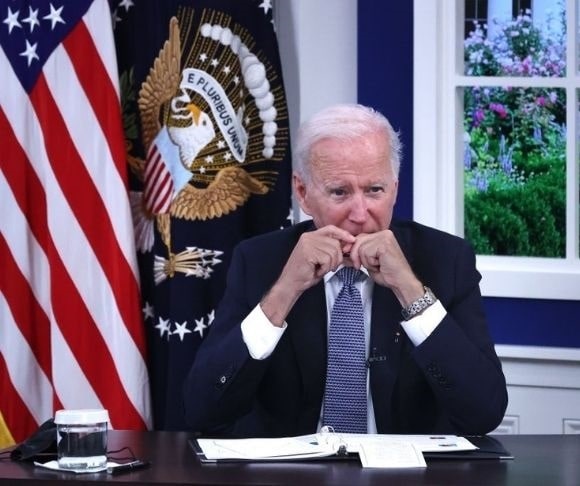Long before COVID-19 plagued global financial markets, there was one single issue that dominated international business headlines for many months: The U.S.-China trade agreement. Now that a new man is in the Oval Office, what has happened with the phase-one trade deal, and has it improved trade relations? From a widening trade deficit to targeted tariff exemptions, the new campaign involves a little bit from the previous administration and some ideas from the current White House regime.
Biden’s Vision of US-China Trade Relations

Katherine Tai
(Photo by Anna Moneymaker/Getty Images)
U.S. Trade Representative (USTR) Katherine Tai outlined President Biden’s new plan on dealing with China. According to Tai, Washington will now embrace a strategy that excludes some Chinese imports from tariffs while also initiating discussions over Beijing’s inability to abide by the provisions of the agreement. Tai noted that the U.S. would ensure all options are on the table to defend its economic interests.
The top trade negotiator revealed that she would push for a meeting with Chinese vice-premier Liu He to review the phase one pact. Tai also wants to home in on the government allocating billions of dollars in state subsidies to critical sectors, such as the semiconductor and steel industries. U.S. officials assert that China’s taxpayer-funded support of these businesses harms American companies.
“Above all else, we must defend – to the hilt – our economic interests,” she said in prepared remarks. “That means taking all steps necessary to protect ourselves against the waves of damage inflicted over the years through unfair competition.”
America’s trade chief vowed to “deploy all tools” to improve U.S.-China trade relations, including efforts that might benefit China more than the United States.
Who Benefits?
As part of the administration’s vision, the U.S. will start a process of exempting Chinese products from tariffs. The consensus is that many factories and industries across the world’s second-largest economy will benefit. However, market analysts think some U.S. stakeholders could accomplish something they have fought for since the early days of the phase one trade deal: Removing punitive levies on certain Chinese goods.
The USTR has been widely criticized by both Congress and the Government Accountability Office (GAO) for not maintaining a more efficient exclusions process. Under former President Donald Trump, U.S. importers submitted approximately 53,000 requests, but only 13% were approved. Benjamin Kostrzewa, a Hong Kong-based trade lawyer with Hogan Lovells who worked on Tai’s team, told the South China Morning Post:
“There was a lot of criticism because U.S. businesses couldn’t really use it very well. Only about 13 per cent of exclusion process applications were successful in the past, and most of them have now expired.
So, there may be some limited benefits for Chinese manufacturers, but overall the direction of the policy remains the same, which is to support U.S. industry before bilateral trade.”
Because Tai’s oration was short on specifics, it remains to be seen if the Biden administration can de-escalate tensions and make U.S.-China trade relations great again.
A Look at the Numbers
 One of the primary objectives for starting a trade war with China was to ensure the country purchased more from the United States. While the coronavirus pandemic altered everything, the data suggest that Washington is not witnessing much improvement on the trade gap. According to the Bureau of Economic Analysis (BEA), the U.S. trade deficit widened to an all-time high of $73.3 billion in August, coming in higher than market forecasts of $70.5 billion. Within the report, it was noted that the shortfall with China rose 10.8% to $31.7 billion. In the first eight months of 2021, the U.S.-China trade imbalance swelled 13.7% year-over-year to $218.9 billion.
One of the primary objectives for starting a trade war with China was to ensure the country purchased more from the United States. While the coronavirus pandemic altered everything, the data suggest that Washington is not witnessing much improvement on the trade gap. According to the Bureau of Economic Analysis (BEA), the U.S. trade deficit widened to an all-time high of $73.3 billion in August, coming in higher than market forecasts of $70.5 billion. Within the report, it was noted that the shortfall with China rose 10.8% to $31.7 billion. In the first eight months of 2021, the U.S.-China trade imbalance swelled 13.7% year-over-year to $218.9 billion.
Recoupling, Not Decoupling
Despite vague promises of resuscitating relations and facilitating better commerce, the incumbent administration is unclear about how it will achieve its aims. While Tai does not think decoupling is “a realistic outcome,” she believes Washington should be assessing a sort of “recoupling.” It is an upbeat attitude, and it is a term that the Chinese leadership wants to hear. However, the positive rhetoric may fall short of addressing the fundamental differences, many of which were why Trump had ignited a trade dispute with the Red Dragon. Instead, it might be a case of trying to look busy without doing anything.
~ Read more from Andrew Moran.




